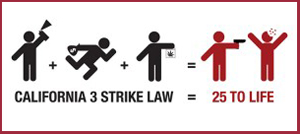Three Strikes
Riverside Third Strike Defense Lawyers
 California’s three-strikes law sets very high mandatory minimum sentencing guidelines for certain types of repeat felony offenses, also called “strikes.” Here in California, a conviction of certain types of crimes, such as robbery, residential burglary, a crime of violence, or any crimes deemed “serious” are considered “Strikes” under California’s Three Strikes Law. Also, any felony in which a deadly weapon was used is also considered a “Strike.”
California’s three-strikes law sets very high mandatory minimum sentencing guidelines for certain types of repeat felony offenses, also called “strikes.” Here in California, a conviction of certain types of crimes, such as robbery, residential burglary, a crime of violence, or any crimes deemed “serious” are considered “Strikes” under California’s Three Strikes Law. Also, any felony in which a deadly weapon was used is also considered a “Strike.”
People with a “strike-able” felony conviction on their record are then subject to increased penalties for any later convictions. Moreover, for any subsequent felony, no matter whether it is considered a strike or not, the time they will face in prison will double. It then gets more severe… After two felony strikes, a third felony conviction comes with a mandatory sentence of 25-years to life in prison! It doesn’t matter whether the third felony was a strike-able offense, or whether it was deemed “serious,” or even how many years passed between the prior convictions. This is why so many people with a “2nd strike” choose to move away from California to another state for fear of dying in prison if they should find themselves in trouble again.
Unfortunately for people already having a record that adds up to 2 strikes, some overly aggressive prosecutors simply file any new cases that come to their office as a “third strike” anytime they can –regardless of the circumstances of the case– especially those prosecutors looking ahead towards running for political office and wanting to “look tough on crime.”
Defense Strategies for Defending a 3rd Strike
When we are defending a client who faces a third “strike” it is more necessary than ever to prepare a winning defense strategy that will discourage the prosecutor from pursuing a Three Strikes conviction. Sometimes Mr. Williams’s reputation will do that as soon as the prosecutor learns that he is taking the case. Prosecutors don’t want to take a chance on loosing a case because of “over-reach” and will reconsider when a defendant hires a well-known, respected trial lawyer.
If, because of the circumstances of the case, the prosecutor simply refuses to negotiate, Mr. Williams may still be able to help his client avoid the harsh three-strikes penalties. Mr. Williams can move to strike a prior strike in a case where following the three-strikes law would cause an injustice. The judge is petitioned to ignore prior strikes during the sentencing phase, if it can be demonstrated that the third crime was not in keeping with the spirit of the three-strikes legislation. The judge then can impose a dramatically shorter sentence — say just a couple of years detention instead of the mandatory 25-years to life.
